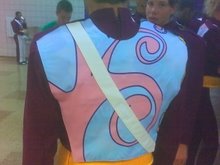Competition...Blessing or Curse? - Part 1 - Drum Corps (cont.)
This is the 4th installment of my series examining the effect of competition on the marching activity.
__________________________________________
Complexity of Material
Complexity of material can be broken down into two sub categories; show design, and technical demand. Both of these are affected by Drum Corps being a competitive activity. The question first of all is how are they affected by competition, and secondly, is this effect good for the activity.
Examining show design, we find that shows today are much more complicated and involved than shows at the dawn of DCI competition. This directly correlates with the increased emphasis on General Effect scoring over the past 20 years. Under the "tic system", shows need not have any overall "general effect", and this was not a major concern for directors and designers at the time. Gradually, GE points became more important, comprising 10%, then 30%, then finally 40% of the overall score. Designers advanced these ideas of "effect" with the development of the "total show concept." This was the idea of every section of the show relating to a larger general theme. This concept remains in place today. Competitive corps who revert to the old show designs find it more difficult to compete in todays Drum Corps context (I'm thinking specifically here of Cadets '03 and Madison '04).
Now is this effect on show design good for the activity? Many people have complained recently that show designs are too complex and ask too much of the audience. While initially, competition drove the change to the "total show concept", nowadays the competitive atmosphere is more of a hindrance to show development than anything else. Designers' ever-expanding visions are being cut, spliced, and crammed into parameters that were never meant to display them. It is akin to a governing body restricting what you could use in a Broadway musical, then forcing the writers to cram it all into 11.5 minutes. Musical ideas cannot be developed fully in the time alloted forcing designers to cash in on the quick effect and leave subtlety behind. New storytelling techniques are burdened by restrictions on personnel and instruments. Show designs are stripped down to the most basic semblance of expression under the weight of competition, demanding of the audience little more than basic form and musical recognition. Freeing the show design of the shackles of competition will bring depth and true complexity to an activity that is already yearning for it. Shows can step out of the banal, and create profound performance art that can have lasting impacts on society.
The second area of complexity deals with the question of technical demand. During the "tic system's" heyday, technically complex musical and visual material was generally toned down, or "watered", to make it easier. The thought with that process was that if you aren't playing something extremely difficult, there is less chance that you will screw it up. The advent of the "build-up" system allowed designers to program in great feats of virtuosic display, because now they received credit for attempting more difficult material. This trend towards more difficulty is still in full force today, as corps keep trying to out-perform previous years.
The question now is does competition driven technicality help or hurt the activity. I am of the opinion that many of the technical demands built into shows these days are exceedingly gratuitous. The average person has trouble distinguishing the difficulty of things that are not blindingly obvious. Only the highly trained judges can sometimes understand and appreciate some of the demands a show makes on the performers. If competition were to disappear, shows would become increasingly easier , however not appear less impressive to the audience. The gratuitous difficulty would be trimmed from the shows, leaving more time for substance and musical narrative.
On both accounts, show design and technical demand, I contend that competition hurts the activity more than it helps it. Show designs would become more fan-friendly and entertaining and some of the technical filler would be trimmed away making for a much cleaner show.
The next installment I will examine the effect competition has on the educational value of Drum Corps...


3 comments:
Hey Joe! Name's Mike Murphy and I've been a fan of Drum Corps competitions since the early 60s when 3 of my sisters had been in a couple of bands. They began in our elementary school by the name of St. Ann's, and eventually went on to the Royal Crownsmen, both local bands. There were occasional competitions here in Cranston, Rhode Island and the sights and sounds are what hooked me as a kid.
Yearly competitions still take place here with some of the High Schools across RI performing. They are great! Of course I'm particularly fond of my Alma Mater's band, "The Thunderbolt Band of Cranston High School East!!"
RI also hosts the largest and oldest Fourth of July Parade in the U.S. here in the town of Bristol.Marching bands from across the country ask to compete it's that popular here! Those bands that ARE invited hold a competition the night before in Colt State Park in Bristol where they proudly get to strutt their stuff. We in RI would like to invite you to the ongoing 4th of July Parades in Bristol,RI. You will not be disappointed! Come check it out!
Mike
ahh, yes the Bristol parade...I remember it well. It was a terrible day in '04 when we marched - cold, windy, rainy, and it also has the reputation for being one of the longer parades in the area, so it was extra fun :) but seriously it was a good experience and I am glad I got to participate...
in 04 we rehearsed in downtown Bristol in a park that was right on the water...the best rehearsal sight you can imagine..
You were in the Bristol 04 parade too? Despite (or maybe because of??) the weather, that was my favorite parade of the season!
I may have missed this, but what corps were you with? I was with Glassmen.
Post a Comment